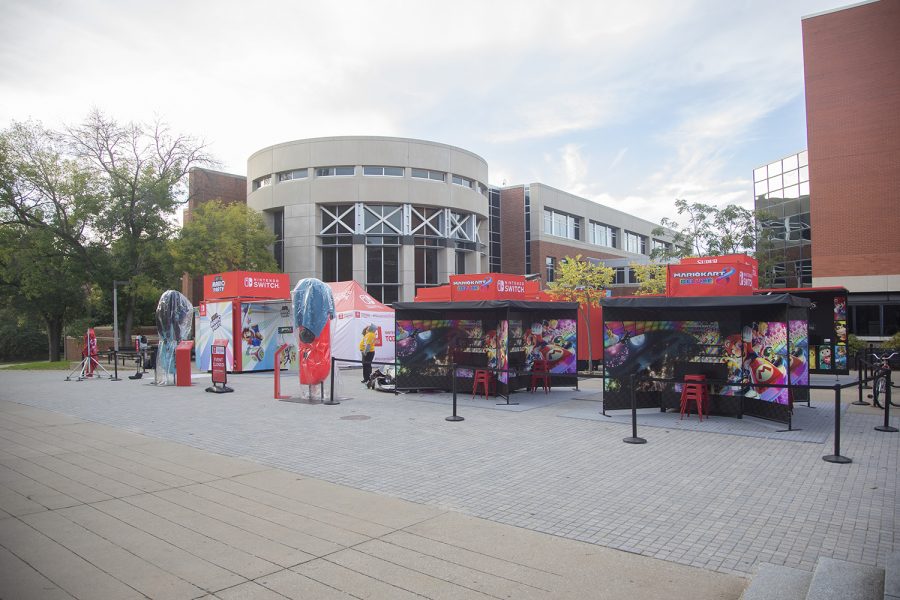Opinion: A pop-up arcade on campus isn’t so bad
The Nintendo Switch attraction is a fun, more appropriate way to market to students than previous pop-up attempts outside the Main Library.
A student security worker guards the Nintendo Switch Together tour event space on the Main Library Plaza on Thursday, Oct. 3, 2019.
October 4, 2019
Like any student walking to the Adler Journalism Building Thursday afternoon, I noticed it right away: the massive Nintendo-topia — screens upon screens of Mario Kart, Super Smash Brothers, Mario Party, and Just Dance, along with branded props and swag. All thoughts of my stressful morning and impending class fled my mind as I greeted the Nintendo worker and, for an hour, proceeded to play in the pop-up arcade.
The Nintendo truck is not the first of the pop-up trucks occupying that exact location this semester. Pop-up shops and giveaways are fairly common on campus these days, from the Pink Campus Tour truck coming annually, to the Aerie and the Maybelline pop-ups this past month.
Some maintain that these trucks impede the learning environment of college. Students shouldn’t be distracted by shopping on their way to the library, detractors say. The Nintendo pop-up; however, was different.
Rather than offering a direct product to purchase, or funneling students through a giveaway line, it offered essentially a mini arcade for students to take a break in the middle of the day and play games they might not have access to otherwise. While it was a strategic marketing ploy — let students sample the Switch so they become interested in buying the several hundred-dollar console — it offered a free interactive event at which to take a break, and managed not to feel like a product was being so forcefully shoved down student’s throats.
Now, this doesn’t completely eliminate the downsides of the pop-up. Going to class was extremely difficult when the alternative was playing Just Dance on the big screen with friends. Additionally, by popping it in the middle of a high-traffic area, students are thrust right into the branded event. The bigger question of whether it is acceptable for larger corporations to infringe on the learning environment is an important one to ask: Where is the line between promoting a brand and infringing on an educational environment?
The event provided a distraction from the regular flow of classes and studying, but that was kind of the point. When coming into college, students need to be able to allocate their time appropriately — that perhaps is the most important skill that’s acquired in the first year or two. It’s easy to make excuses for not going to class, and students have to force themselves to actually attend.
Additionally, college students are, for all intents and purposes, adults. They know why the company is there — to sell you on a product. It’s not akin to school children being marketed to. College students have their own buying power, and they won’t support a company unless they want to.
As easy as it is to frown at the capitalist motivations behind corporations coming to campus, if it benefits the students for little to no effort on their part, it might not be the worst thing in the world.
Sampling brand new Switch games? Hanging out with friends and playing video games when many students can’t spend $300 to buy the console? Getting free ice cream? It’s valid to be skeptical, but it’s challenging to see an innate harm in allowing it on campus.
When companies offer activities or events rather than just a product, it becomes something different from a standard marketing ploy. Companies are likely to keep coming to campus no matter what, so upcomers could take a cue from this pop-up and give students something to offer instead of blatantly throwing their product at them.
Columns reflect the opinions of the authors and are not necessarily those of the Editorial Board, The Daily Iowan, or other organizations in which the author may be involved.





